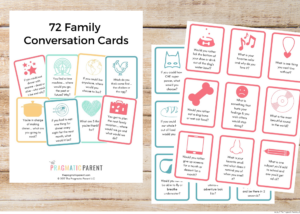It’s a common question most parents ask themselves – why aren’t my kids listening? Does this sound like you? When you ask your child to do something or even, stop doing a behavior, it’s expected they listen and follow your guidance. Or, so we hope. But this isn’t always the case, is it? Learn why your kids aren’t listening and how – just by your own actions – can get your children listening the first time you ask

Get Kids to Listen Without Nagging, Arguing or Repeating Yourself 1,000 Times
How often do you ask your kids to do something or maybe, tell them to stop doing another thing and they don’t listen? Like when you told them to stop dribbling the basketball in the house because you were on the phone or to put their shoes away.
You ask once, then twice and by the time you’re ready to ask a third time, you can feel the pressure inside about ready to reach critical levels. Like a tea kettle on the stove ready to whistle, this is how it feels inside.
Having to repeat yourself several times and not getting the action you requested, or maybe even an acknowledgment they heard you can make you feel annoyed, frustrated, even angry.
It’s easy to finger point at your child when this behavior happens.
“Why aren’t they listening?”
“Don’t they hear me?”
“Are they tuning me out?”
These thoughts may be swirling around but this may be even harder to hear.
It might be time to turn that finger right back around to the person pointing it. To you.
The key to getting kids to listen is the approach you take when you make your request and the level of distraction that’s present the moment you make the request.
Learn why your kids aren’t listening and then learn how to get your kids to listen the first time. Won’t it be nice to never repeat yourself three, or four or more times?
1) LEAD BY EXAMPLE
If you want your kids to listen, you need to model this behavior for them. For example, if you tell your kids not to say bad words, but then say them yourself… they’re more likely to follow your example.
Lead by example.
If you want your kids to listen, you need to reciprocate this behavior. Put down your phone and get to their level and take a moment to hear what they should say or tell you. Give them your full attention and look them in the eye when they’re talking to you.
Demonstrate what active listening looks like, but also teach children respectable behavior to use at school, with coaches and throughout life.
If you actively listen to them, they’ll actively listen to you.
2) REFRAME HOW YOU MAKE YOUR REQUEST
When you use positive language to ask your child for something, you’ll have better results than if you yell at them to stop doing something. A negative request will often be met with a negative response.
Here are some examples:
- Rephrase a negative statement such as “don’t run!” to a positive request, like “please, walk in the house so we you don’t slip and fall.”
- Another example is “stop hitting!” which can be spun in a positive way like “we use our hands for giving high fives.”
Framing statements negatively sets the tone for a negative response.
If you just said, “don’t hit your sister” they’ll focus on the word DON’T.
When you reframe it and say, “please be gentle” or “your hands are for playing catch together” kids will zero in on the positive alternative.
3) BE PRESENT WHEN YOU STATE A REQUEST
It’s easy to yell across the room at your kids to “stop throwing a ball by the TV” or “get a water bottle,” as you run out the house. You’ve probably already seen this doesn’t generally get you desired results.
Kids who are engaged in their own activities are entwined in what they’re doing, it may seem like they’re intentionally ignoring you – but they aren’t. They’re incredibly focused on what they’re doing they don’t hear you.
If you want them to stop doing something you first must gain their attention.
Being passive and calling out across the room won’t have your kids jumping up and running to do chores.
Instead, stand up, walk over to your child and make your request at their level. If there is something competing for your attention – TV, electronics, a game, etc. –turn it off or temporarily take it away so you have their full attention and can talk uninterrupted.
4) DON’T DEMAND, INSTEAD OFFER CHOICES & KEEP A HEALTHY BALANCE
How often do we demand something of our kids, only to have them rebel against it?
I know as an adult when someone tells me to do something, I’m less likely to want to do it and may rebel against the request myself.
Kids are the same way; they do not want to be told what to do all the time.
The trick? Asking them to do something by providing two choices for them to pick from. When they feel in control of the situation and can make the decision without being forced, they’ll be more compliant.
Examples:
- When your daughter doesn’t want to wear what you picked out for the day, offer two separate outfit choices for her to choose from.
- If you son is throwing a ball in the house, ask him if he’d like to throw the ball outside or play a different game in the house where he won’t break anything.
- If your son doesn’t want to clean his room, offer the choice for him to make his bed or pick up his toys first. Break the task of cleaning his room into smaller bite-size pieces of work so it doesn’t seem so large of a task all at once.
5) STICK TO YOUR LIMITS
Follow through with what you say so your kids understand if you ask them to do something, they need to listen the first time or there may be a consequence.
It’s easy enough to say “If you do that one more time, I will….” but make sure the consequence you’re threatening is reasonable to the situation and you’re prepared to follow through with it.
When we don’t follow through with consequences or administer them “only sometimes,” kids see no reason to stop their behavior.
Make sure the consequence you tie to the situation is practical to the offense and not out of proportion or unconnected to the situation.
Be firm setting boundaries in your home which are reasonable, for safety and moral reasons, but not too constrictive so that your children feel prohibited from exploring. Follow through with boundaries consistently, just like you do with consequences so children learn where the hard line is drawn.
6) LOWER YOUR HIGH EXPECTATIONS
It’s important to be flexible and give kids breathing room – and grace – to be just that, children. They need room to explore and learn without the fear of facing consequences or being reprimanded.
Watch and observe your kids, if the situation can play out where they resolve their disagreement on their own and haven’t physically impeded each other’s space, then let them work it out on their own.
If it’s clear the situation calls for an adult to step in or one of the rules or boundaries in your house have been crossed, then you can step in an appropriate way.
You Might Like…
- How to Create a Positive Home (And Why this Will Affect Your Kids Forever)
- 9 Ways to Build Your Child’s Confidence
- Help Develop an Emotionally Intelligent Child Who Can Talk About Their Feelings
- Stop Feeling Like You Have Mom Burnout
- What are the Triggers That Cause You to Yell and Lose It With Your Kids?





